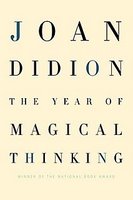
When it comes to The Year of Magical Thinking, I believe its appreciation will turn out to be deeply subjective. It comes down to this: either you have experienced the death of someone very close to you or you haven’t – and it will probably be hard to imagine how the other half is feeling about this personal memoir.
I came to this conclusion when I tried to imagine what I might have thought about Didion’s book had my father not died when I was eighteen and drew a blank. Maybe it would still be moving, but I know it wouldn’t ring true – I wouldn’t be able to recognize so many of the strange thoughts that went through her head after the death of her husband, and to feel a bond over things I never shared with anyone.
Some reviewers seemed offended at the lack of journalistic tone: “ I’d like to read about Ms Didion’s marriage, but I’d like her to write about it as a reporter, not as a mourner” said Adam Begley in The New York Observer. Wow! That to me is like saying “I want you to tell me about the experience of becoming a mother, or falling in love, but leave everything emotional out of it”. That said I think it’s obvious that the whole grieving period presents special obstacles for individuals who have always been very rational, dependent on facts, and who maybe thought they had a pretty good handle on their feelings.
Joan Didion by professional (de) formation and character must have been such a person and you feel her throughout the book – with the quotes of medical, psychological and sociological books – trying to grapple her husband’s absence as if it were an intellectual problem, just to find that academia provides small comfort. She keeps repeating in her mind the events leading to the sudden death of John Gregory Dunne, and this provides the backbone of her book – in between there are variations, other memories of homes, conversations, travel, of their daughter (gravely ill before Dunne’s death, in a chain of events which would sound totally unrealistic in a work of fiction), but she always brings you back to that moment.
The names mentioned in the book also seemed to upset Begley and other readers who spoke of name-dropping (check out metacritic’s site) – which I must confess didn’t bother me much since I didn’t recognize any of them. I find it natural that her friends are other writers or newspaper editors – she’s been around since the sixties for godsake. Just like other readers I did, however, feel some jealousy of the L.A. homes or the constant Hawaii trips – still, I think you’d have to be a really bitter person to let that detract you from the main theme of the book. She doesn’t mention those places to look superior – if anything they are presented as superior because she enjoyed them with her husband, and the feeling I get is that they sound glamorous because she tinges all the memories of their common life with happiness. Even the tough moments every couple goes through are special, because he was there.
Some moments in life are lonely, but if The Year of Magical Thinking proves anything, is that they needn’t be – it turns out that even when we feel bereft, there are many others who are traveling the same winding path.
No comments:
Post a Comment